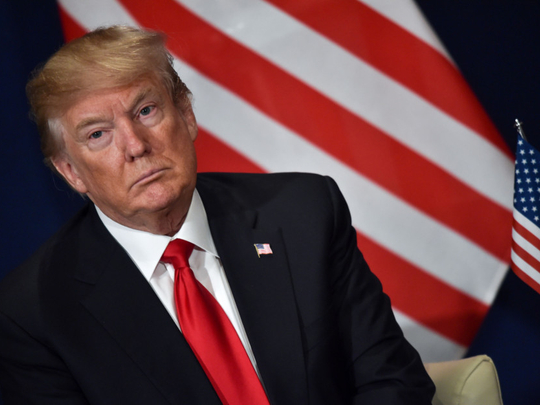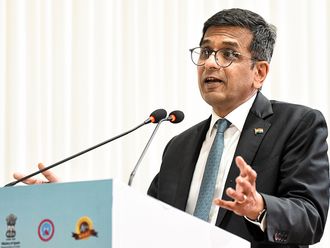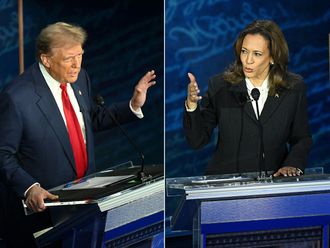
Anyone who reads the United States National Security Strategy of 2018 will imagine a country close to collapse and must take decisive action to save itself! The strategy, too, warns of “the erosion of American industry over the past two decades and explicitly refers to the belief that “massive military superiority is needed to prevent the success of the enemy and ensure that the sons and daughters of America will not be in an unfair battle”.
Successive US administrations, since the time of the administration of former president Ronald Reagan, have been issuing the “strategy” — which is originally not binding to Congress — to ensure American superiority in all military, economic, technical, civil and other fields, and to weaken the ability of adversaries to compete and threaten. But today, it reveals more clearly that US President Donald Trump’s approach, which, since his arrival at the White House, has raised many unanswered questions about American politics, such as the consolidation of a unipolar American globalisation. According to the Guardian, the strategy is “an attempt to compile the views and statements of President Trump about events in the world, in addition to the opinions of those who are close to him in power. It showed us a paper manifesting the deception of this dangerous and irregular administration, trying to build a framework for making serious decisions”.
The ‘most important’ of what Trump presented in his strategy is his declaration of the real American priorities. Policy regarding Middle East and specifically the issue of the Israeli-Palestinian conflict came at the end of these priorities. The strategy is based on four basic issues — protecting the homeland, promoting American prosperity, maintaining world peace, and strengthening America’s role in the international arena.
Yet, the talk about the ‘strategy’ topped headlines in the Israeli press because of one sentence in the 68-page strategy document: “For decades it has been said that the Israeli-Palestinian conflict is the main issue that prevented peace in the region, but today it is clear that the Islamic terrorist extremism coming from Iran has led us to realise that Israel is not a source of conflict in the Middle East, and that certain countries have demonstrated the potential for joint cooperation with Israel to counter Iranian threats.” Ephraim Gator wrote in the Israeli newspaper Maariv saying “the importance of the strategy presented by President Trump under the headline ‘Israel is not responsible for instability in the Middle East’ is more important than the president’s declaration of recognition of occupied Jerusalem as the capital of Israel”!
It is true that US diplomats and experts in the region’s affairs expected that the Trump strategy would not have a significant impact in practice, since “it is not realistic, and is not designed to deal with tiny parts”, says the former Middle East peace negotiator in a number of US administrations, Aaron David Miller. However, Zev Chafets, an Israeli columnist, wrote in the Independent that “in addition to declaring that [occupied] Jerusalem is the capital of Israel, Trump has slapped reality in the world of American foreign policy. He realises that there is no Arab world working for justice, it is an area of sovereign states that seek to achieve what they consider to be their own interests. As the new strategy says, the Arab states increasingly find common interests with Israel in the face of common threats”. Such a view was also reflected in an article jointly written by Amos Yadlin, executive director of Tel Aviv University’s National Security Studies Institute and fellow researcher Avner Golub. They saw that “with such a document, there is a need for a close and lasting dialogue between Israel and the United States, whose goal is to develop a coordinated US-Israeli strategy against Iran that includes the realisation of the principles contained in the American document, while preserving Israeli interests. It is therefore expected that there will be a joint dialogue on the policy to be pursued in the light of the principles of the document, particularly at the military strategic level. This means that in the coming period, Israel will have an impact in shaping US policy in practice.”
The danger in the current US National Security Strategy is to dismantle what has been referred to since 1967 as a linkage between the Palestinian-Israeli conflict and instability in the Middle East. So we ask: Does President Trump really want to put forward what he calls the ‘Deal of the Century’? Is there really a ‘deal’ on the basis of the resolution of the Palestinian issue, the most important in the Middle East, made absent by Trump from the American national security strategy? This strategy is in fact an attempt to promote the irrelevance of the Palestinian issue and that the Palestinians must give in to the status quo, while Israel is to be seen as a ‘normal state’ that must be integrated in the region to help solve security problems, ignoring what it is doing to expand the area of colonisation in the historical Palestinian homeland.
Professor As’ad Abdul Rahman is the chairman of the Palestinian Encyclopaedia.










